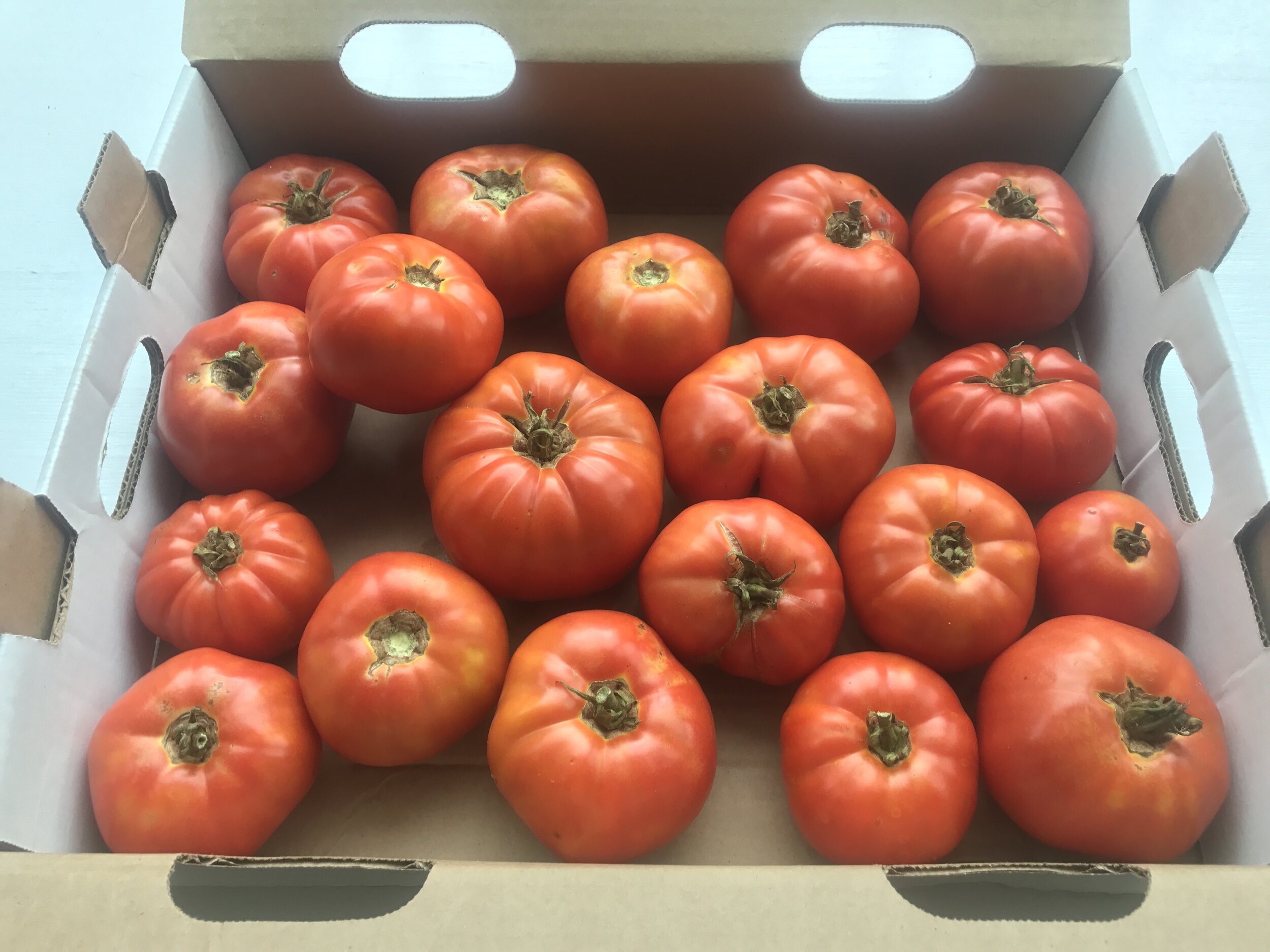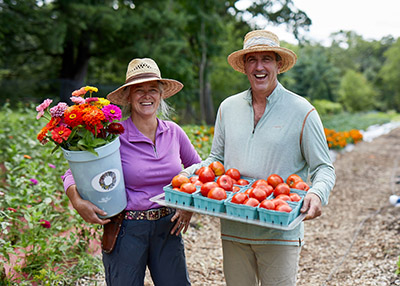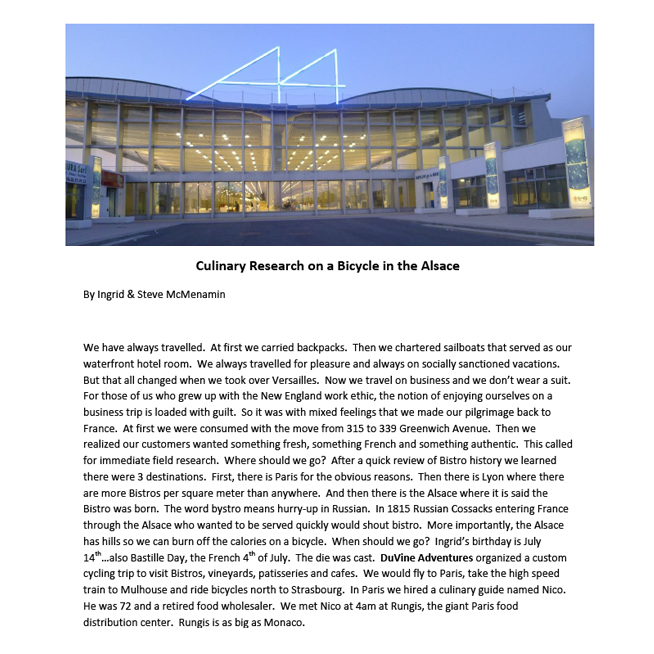Featured Publications
UConn Orchard Grows Thanks to Local Farmer
Anna Zarra Aldrich, College of Agriculture, Health and Natural Resources
The orchard is part of the College of Agriculture, Health and Natural Resources (CAHNR), and is part of a newly launched effort to reestablish UConn’s longstanding fruit research and education program.
The two-year-old Fuji Supreme and Ambrosia apple trees come to the UConn orchard courtesy of Steve McMenamin, a farmer who runs an organic produce farm in Greenwich, Connecticut.
How Greenwich's Versailles Farms planted 3,000 apple trees in a trellised orchard
Greenwich Time
GREENWICH — A lot of puzzled and curious motorists have been driving by a vacant lot on upper King Street and wondering what was happening. Over the past several months, all within view of curious commuters, workers have been taking down weeds, invasive species and junk trees and prepping the site for something.
"Lots of curiosity," said Steve McMenamin, whose local agricultural operation Versailles Farms has been the contractor at the site. "Everybody's been stopping and asking: What's going on here."
The cleared field is becoming an apple orchard.
A Greenwich farm owner is always looking for a new locally sourced product. Now he’s making high-end charcoal
Greenwich Time
At Versailles Farms up in the northwest corner of town, Steve McMenamin is constantly looking for new products to make the most from their 15-acre farm. He and his wife have become the largest producer of shitake mushrooms in the state, and in recent times, he has been turning his attention to producing high-end charcoal, all of its locally sourced.
New Jersey Tomato, Victim of Modern Farming, Vies for a Comeback
The New York Times
The Jersey tomato, red, ripe and juicy, was once revered as the best to be had, with a tangy, sweet-tart flavor that was the very taste of summer.
Scientific Breeding Gives New Jersey the Rutgers Tomato
New Jersey State Horticultural Society News - November 1934
The Rutgers tomato was developed by selections from a cross made in 1928 between the Marglobe and J.T.D. varieties.
The Dirt: Customers Love Buying Local.
Dirt to Dinner
The successful farms are those who can marry the best techniques that are applicable to the crop, the soil, and the environment. It is not just one or the other - it can be both!
Versailles Farms: Working ‘simpatico with the land’
Greenwich Time
In 2012, McMenamin and his wife, Ingrid Delson, bought the property adjacent to their backcountry Greenwich home. The following year, they sold their Greenwich Avenue restaurant, renowned for its pastries and celebrity sightings, to focus on other endeavors, including the farm. In a few years, the couple has restored the Locust Road property to its one-time purpose as New England farmland. This summer, they have begun sharing their produce and story with the community.
Versailles Farms and Summer Stand:
Deliciousness Grows Here
Fairfield County Look
There’s a whole lot of deliciousness growing at Versailles Farms in backcountry Greenwich. In fact, there’s so much fresh flavorful bounty, the local produce gracing the tables at several Greenwich country clubs is now available to the public at the Versailles Farms’ Summer Stand.
Love, death and food in Greenwich
When Versailles restaurant opens at 339 Greenwich Ave. next month, Versailles at 315 Greenwich Ave. will close. The continuity is not lost on Ingrid McMenamin, owner of the bistro-patisserie and bakery. It’s something of the point, realized every time a grandparent treats a grandchild to an éclair as good as the one the grandparent knew as a child.
Versailles - A renewed French connection on the Avenue
With the face of Greenwich Avenue changing so much in recent years, it’s a comfort to witness the rebirth of Versailles, a bistro and patisserie that has been a popular meeting spot for thirty years. The French favorite recently relocated just a few doors down from its original, cozy-slice-of-Paris location. Versailles’s brunch and lunch menu and decadent, freshly baked desserts have enjoyed a loyal following, but the new draw is the full dinner menu prepared by executive chef,Jean-Pierre Bagnoto.
Top 10 trends in market farming
Market farming is a constantly evolving business. Crops, markets, laws, products, consumer trends — nothing stands still in this line of work. Here are the top trends that are likely to affect market farmers this year. You can read more about these topics in upcoming issues of Growing for Market and there are additional resources at www.growingformarket.com/categories/trends.
Culinary Research on a Bicycle in the Alsace
We have always traveled. At first we carried backpacks. Then we chartered sailboats that served as our waterfront hotel room. We always traveled for pleasure and always on socially sanctioned vacations. But that all changed when we took over Versailles. Now we travel on business and we don’t wear a suit. For those of us who grew up with the New England work ethic, the notion of enjoying ourselves on a business trip is loaded with guilt. So it was with mixed feelings that we made our pilgrimage back to France.
Pairing fine beers with fine food
Let's call it our dinner with Jean-Pierre, as it was to be a voyage of discovery in the adventurous pairing of beer and food.
To my left was Walter Stratton, a wine expert and wine-lover of many decades who admitted to little affinity for beer.
Versailles Adds a Meal
(To Eat Before Dessert)
SINCE 1980, Versailles in Greenwich has been a local institution, for croissants or a full breakfast in the morning or a cafe meal at lunch. But since Sept. 14, when this patisserie-cum-cafe moved a few doors down Greenwich Avenue to a slightly larger space, it has served dinner as well. Its business card attests to its versatility: Boulangerie — Patisserie — Bistro Café.














